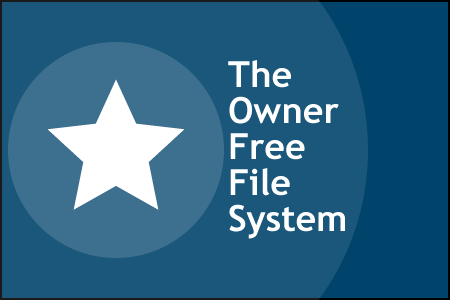
The Owner-Free File System (OFF System, or OFF for short) is a peer-to-peer distributed file system in which all shared files are represented by randomized multi-used data blocks. Instead of anonymizing the network, the data blocks are anonymized and therefore, only data garbage is ever exchanged and stored and no forwarding via intermediate nodes is required. OFF claims to have been created with the expressed intention “to cut off some gangrene-infested bits of the copyright industry.”[1]
OFF development started within the hacktivism group The Big Hack in 2003 by the hackers Cheater512, CaptainMorgan, Aqlo and WhiteRaven. In 2004, a rudimentary version was finished, written in PHP, which was distributed as two demo CDs. Following these, SpectralMorning re-implemented the functionality in 2004 in C++, which led to the current “mainline” OFF client.
On August 14, 2006, CaptainMorgan posted a letter of “closing” addressed to the “Copyright Industry Associations of America”, such as the RIAA and MPAA, stating that they have created OFF with the purpose of ending “all of your problems with consumer copyright infringement.”[2]
Today we announce a massively distributed copy-less file system. A place where all content is available instantly, anonymously and to everyone, without breaking any laws. Today we announce the Owner-Free File System. An island of sanity in your sea of madness.
In 2008, the network consisted of around 50 nodes. On April 11, 2008, a beta test was held[3] with a network size of over 100 nodes. Since SpectralMorning stopped work on OFF in late 2008, only minor bug fix releases were made to mainline OFF.
Starting from 2007, an alternative, but compatible client was developed, called BlocksNet. Written in Ruby and well-maintained, it saw major improvements over recent time. It has been under development until 2011.[4]
The client OFFLoad is a fork from mainline OFF, which seemingly adds no features. Reasons for the fork are unclear. Another distantly related program is Monolith, which uses a similar principle to OFF. It was created after OFF and features no multi-use of blocks and no networking.
The OFF System is a kind of anonymous, fully decentralized P2P file sharing program and network. In contrast to other anonymous file sharing networks, which derive their anonymity from forwarding their data blocks via intermediate network nodes, OFF derives its anonymity from anonymizing the data files.[5] Thus, the system refers to itself as a brightnet to contrast its method of operation with that of private file sharing systems known as darknets and with traditional, forwarding anonymous P2P programs.
In order to store a file into the local OFF storage, resp. block cache, choose the tuple size (default 3), split the source file into blocks of size 128 KiB (pad with random data to fit) and for each, do the following:
Finally, store the descriptor list in its own block (or blocks, if the list is larger than 128 KiB) and insert these blocks into the block cache and generate an OFF URL for referencing the source file and output it to the user or into the local OFF URL database.
To retrieve, obtain the descriptor block or blocks and for each contained set of size , do the following:
OFF derives its anonymity from the following:
Because OFF anonymizes the data blocks being exchanged instead of the network, no forwarding via intermediate nodes is required. Therefore, this method has a higher degree of efficiency than traditional, forwarding-based anonymous P2P systems.
The forwarding method requires that a data block is uploaded and downloaded several times before it reaches its destination, which happens between 5 and 15 times.,[6] which, according to the resulting formula , is equivalent to an overhead of 900 to 2900%, while the overhead of OFF without optimizations is about 200%. ( is the source file size, the inbound tunnel length and the outbound tunnel length. Plus 1 for the hop between the Outbound Endpoint and the Inbound Gateway.)
Efficiency can be further increased:
OFF implementations: